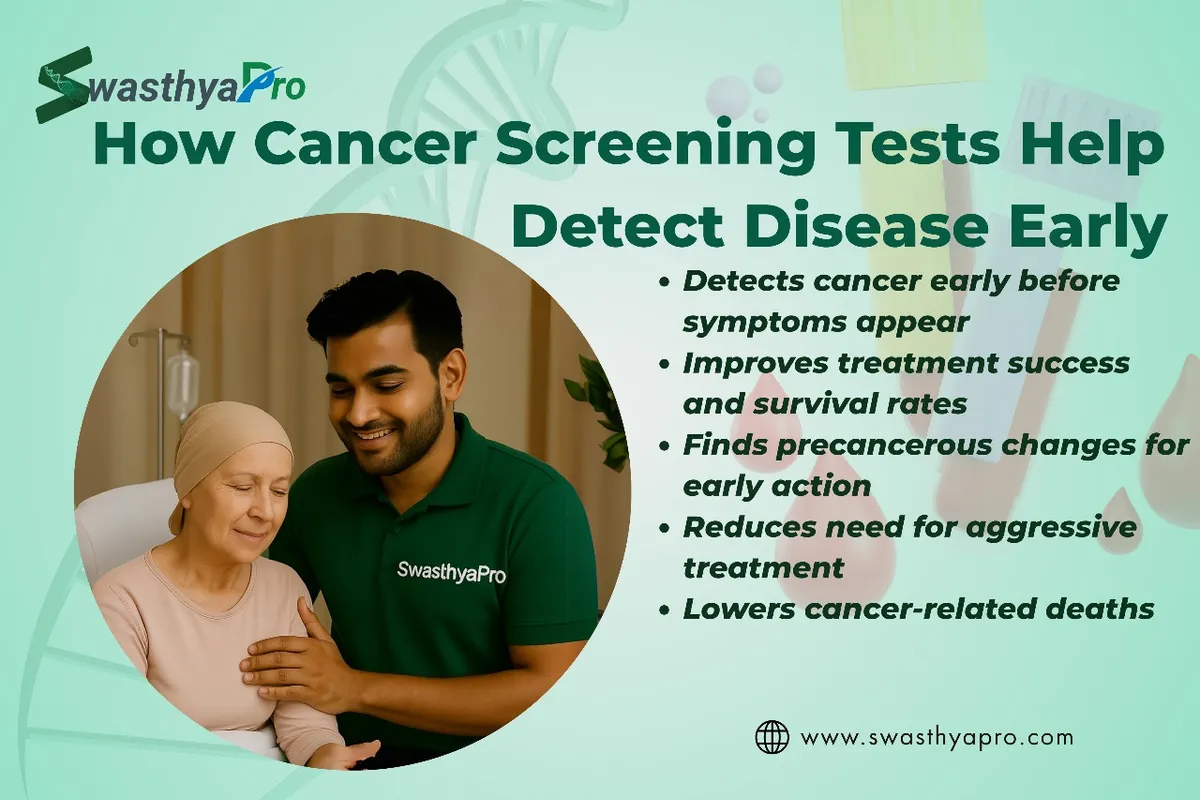Cancer Screening Test vs. Diagnostic Test

What’s the Difference?
When it comes to cancer, timing is everything. The sooner it’s found, the more options you have to treat it effectively. But people often get confused between two terms that sound similar but serve very different purposes: Cancer Screening Test and Diagnostic Test.
So, what exactly is the difference? And why does it matter? In this article, we’ll break it down in the simplest way possible so you can make smarter health choices for yourself and your loved ones.
What Is a Cancer Screening Test?
A Cancer Screening Test is a routine medical test done before any symptoms appear. It’s like a regular health check-up but specifically aimed at catching early signs of cancer. These tests are meant for people who feel healthy but may be at risk due to age, gender, or family history.
For example:
- A mammogram is a Cancer Screening Test for breast cancer.
- A Pap smear is used to screen for cervical cancer.
- A colonoscopy is used for colon cancer screening.
- A low-dose CT scan is a screening method for lung cancer in smokers.
- A PSA blood test is often used to screen for prostate cancer.
Cancer Screening Tests are done on a schedule — every year, every 3 years, or every 10 years — depending on the test and your personal risk.
What Is a Diagnostic Test?
A diagnostic test is performed after symptoms appear, or if a Cancer Screening Test finds something suspicious. Unlike a screening test, a diagnostic test is more focused and detailed. Its purpose is to confirm whether cancer is actually present and, if so, what type it is and how far it has spread.
For example:
- If a mammogram finds a lump, a biopsy (diagnostic test) may be done to test the lump’s cells.
- If a Pap smear is abnormal, a colposcopy might follow to examine the cervix more closely.
- If a colonoscopy finds a growth, it may be removed and tested in a lab.
Diagnostic tests often include imaging scans, blood tests, or tissue biopsies — and are performed under medical supervision, not as part of a routine check-up.
Why Both Tests Are Important
You might think, “If I can just wait for symptoms, why bother with a Cancer Screening Test?”
Here’s why that thinking can be dangerous:
Many cancers grow silently for months or years before showing signs. By the time symptoms appear, the cancer might have already spread. That’s why Cancer Screening Tests are so critical — they can catch cancer early, sometimes even before it forms.
Diagnostic tests, on the other hand, are your next step if something unusual is found. They give doctors the information they need to create a proper treatment plan.
So, in simple terms:
- A Cancer Screening Test looks for red flags.
- A Diagnostic Test confirms what the flag means.
Real-Life Example
Let’s say you’re a 45-year-old woman who goes in for a routine Cancer Screening Test — a mammogram.
- The mammogram shows a tiny lump.
- You feel completely fine, no pain, no changes.
- The doctor recommends a diagnostic test — a biopsy — to find out what the lump is.
- The biopsy shows early-stage breast cancer.
- You get treatment early and fully recover.
This is how screening and diagnosis work together to save lives.
Common Myths Cleared
- Myth: “If I feel okay, I don’t need a test.”
- Fact: Cancer Screening Test are for healthy people. You don’t need symptoms to be at risk.
- Myth: “Screening and diagnosis are the same.”
- Fact: They serve different roles. Screening finds the problem; diagnostic testing explains it.
- Myth: “All tests are painful or risky.”
- Fact: Most Cancer Screening Tests are simple and low risk. Diagnostic tests are more detailed but usually necessary.
Final Thoughts
Understanding the difference between a Cancer Screening Test and a Diagnostic Test can help you take charge of your health.
- Use Cancer Screening Tests as a preventive tool.
- Rely on Diagnostic Tests to explore what’s really going on if there’s a concern.
Both are important. Both save lives. But knowing when and why each is used puts the power in your hands.
Talk to your doctor, know your risks, and don’t delay that first step. The right Cancer Screening Test at the right time could be the reason you catch something early — and beat it.